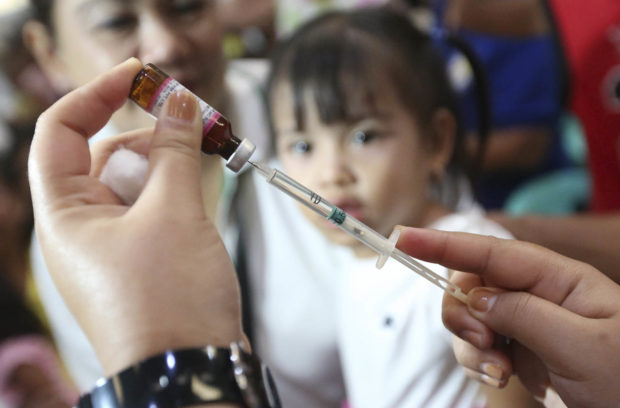
LIGTAS TIGDAS In this file photo, a health worker prepares an antimeasles vaccine during a supplemental immunization activity in Parañaque City. —MARIANNE BERMUDEZ
MANILA, Philippines — Despite the threat of COVID-19, immunization will continue to be conducted in various health facilities in the country, Health Undersecretary Maria Rosario Vergeire said on Wednesday, in response to a World Health Organization (WHO) warning that 117 million children in 37 countries, including the Philippines, are now at risk of missing out on their measles vaccine because of the ongoing global health crisis.
“We continue to vaccinate our children aged 0-12 months as part of our policy that vaccination and other essential health services should continue even with the COVID-19 pandemic,” Vergeire said.
The health official, however, did not say how parents could access government health services with public transportation still suspended because of the virus-triggered lockdown in many areas in the country.
An assessment done by the world health body and its partner groups in the Measles & Rubella Initiative showed that the Philippines is one of 13 countries where the measles vaccination program “may be postponed” due to the threat of COVID-19.
Currently, 24 countries, mostly in South America and Africa, have put their measles vaccination program on hold.
Under the WHO guidelines, countries may pause their immunization campaigns if “there is no active outbreak of a vaccine-preventable disease.”
Prior to deciding on the suspension, governments were urged to conduct a “careful risk-benefit analysis,” especially if the risks of COVID-19 transmission are “unacceptably high.”
Should the vaccination program for measles and other diseases be temporarily halted because of the new coronavirus threat, governments should “intensify efforts to track unvaccinated children so that the most vulnerable populations can be provided with measles vaccines as soon as it becomes possible to do so,” the WHO said.
“Urgent efforts must be taken now at local, national, regional and global levels to prepare to close the immunity gaps that the measles virus will exploit, by ensuring that vaccines are available and that they reach children and vulnerable populations, as quickly as possible, to keep them safe,” it added.
In Southeast Asia, the Philippines has the highest number of COVID-19 cases at 5,453, as of Wednesday. It also has the highest number of confirmed measles cases in the region at 2,494, as of Saturday last week, the WHO data indicated.
In February last year, the Department of Health (DOH) declared a measles outbreak as the vaccination rate for the preventable respiratory disease plummeted to 32 percent.
A community must have a vaccination rate of 95 percent for it to achieve herd immunity.
While the DOH was able to arrest the spread of the disease, it saw the total number of confirmed measles cases nationwide spike to nearly triple to 47,722, with close to 600 deaths in 2019. In 2018, the total cases were only over 16,600, with 147 deaths.